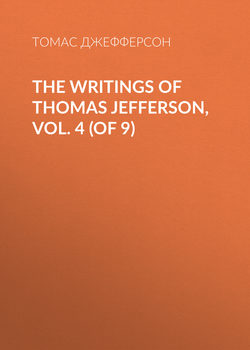Читать книгу The Writings of Thomas Jefferson, Vol. 4 (of 9) - Томас Джефферсон, Thomas Jefferson - Страница 44
TO MR. HAMMOND, MINISTER PLENIPOTENTIARY OF GREAT BRITAIN
ОглавлениеPhiladelphia, December 15, 1793.
Sir,—I am to acknowledge the honor of your letter of November 30th, and to express the satisfaction with which we learn, that you are instructed to discuss with us the measures, which reason and practicability may dictate, for giving effect to the stipulations of our treaty, yet remaining to be executed. I can assure you, on the part of the United States, of every disposition to lessen difficulties, by passing over whatever is of smaller concern, and insisting on those matters only, which either justice to individuals or public policy render indispensable; and in order to simplify our discussions, by defining precisely their objects, I have the honor to propose that we shall begin by specifying, on each side, the particular acts which each considers to have been done by the other, in contravention of the treaty. I shall set the example.
The provisional and definitive treaties, in their 7th article, stipulated that his "Britannic Majesty should, with all convenient speed, and without causing any destruction, or carrying away any negroes, or other property, of the American inhabitants, withdraw all his armies, garrisons, and fleets, from the said United States, and from every port, place, and harbor, within the same."
But the British garrisons were not withdrawn with all convenient speed, nor have ever yet been withdrawn from Machilimackinac, on Lake Michigan; Detroit, on the strait of Lakes Erie and Huron; Fort Erie, on Lake Erie; Niagara, Oswego, on Lake Ontario; Oswegatchie, on the river St. Lawrence; Point Au-fer, and Dutchman's Point, on Lake Champlain.
2d. The British officers have undertaken to exercise a jurisdiction over the country and inhabitants in the vicinities of those forts; and
3d. They have excluded the citizens of the United States from navigating, even on our side of the middle line of the rivers and lakes established as a boundary between the two nations.
By these proceedings, we have been intercepted entirely from the commerce of furs with the Indian nations, to the northward—a commerce which had ever been of great importance to the United States, not only for its intrinsic value, but as it was the means of cherishing peace with those Indians, and of superseding the necessity of that expensive warfare we have been obliged to carry on with them, during the time that these posts have been in other hands.
On withdrawing the troops from New York, 1st. A large embarkation of negroes, of the property of the inhabitants of the United States, took place before the commissioners on our part, for inspecting and superintending embarkations, had arrived there, and without any account ever rendered thereof. 2d. Near three thousand others were publicly carried away by the avowed order of the British commanding officer, and under the view, and against the remonstrances of our commissioners. 3d. A very great number were carried off in private vessels, if not by the express permission, yet certainly without opposition on the part of the commanding officer, who alone had the means of preventing it, and without admitting the inspection of the American commissioners; and 4th. Of other species of property carried away, the commanding officer permitted no examination at all. In support of these facts, I have the honor to enclose you documents, a list of which will be subjoined, and in addition to them, I beg leave to refer to a roll signed by the joint commissioners, and delivered to your commanding officer for transmission to his court, containing a description of the negroes publicly carried away by his order as before mentioned, with a copy of which you have doubtless been furnished.
A difference of opinion, too, having arisen as to the river intended by the plenipotentiaries to be the boundary between us and the dominions of Great Britain, and by them called the St Croix, which name, it seems, is given to two different rivers, the ascertaining of this point becomes a matter of present urgency; it has heretofore been the subject of application from us to the Government of Great Britain.
There are other smaller matters between the two nations, which remain to be adjusted, but I think it would be better to refer these for settlement through the ordinary channel of our ministers, than to embarrass the present important discussions with them; they can never be obstacles to friendship and harmony.
Permit me now, sir, to ask from you a specification of the particular acts, which, being considered by his Britannic Majesty as a non-compliance on our part with the engagement contained in the 4th, 5th, and 6th articles of the treaty, induced him to suspend the execution of the 7th, and render a separate discussion of them inadmissible. And accept assurances, &c.
